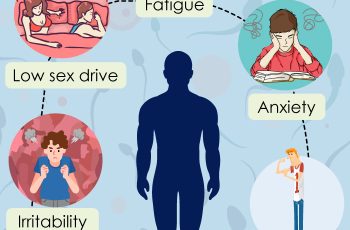Ad Blocker Detected
Our website is made possible by displaying online advertisements to our visitors. Please consider supporting us by disabling your ad blocker.
Hey there! Have you ever wondered about the risks of having high testosterone levels? Well, today we’ll be taking a closer look at this fascinating topic. Specifically, we’ll explore whether a testosterone level of 1200 is considered too high and what potential risks might be associated with it. So, buckle up and get ready to delve into the world of testosterone and its potential effects on your health and well-being.
What are the potential risks of having high testosterone levels?
Having high testosterone levels can lead to potential risks of testosterone such as increased aggression, acne, and enlarged prostates in men. It may also cause baldness, infertility and irregular menstrual cycles in women. Additionally, it can lead to an increased risk of heart disease and stroke.
Risks of Having High Testosterone Levels
Having high testosterone levels can bring about various risks and complications for your physical health, psychological well-being, reproductive system, cardiovascular health, metabolism, bone health, hair and skin, prostate and testicles, as well as your relationships with others. It is important to be aware of these risks and take appropriate measures to maintain a healthy balance of testosterone in your body.

This image is property of images.pexels.com.
Physical Health Risks
When testosterone levels are excessively high, certain physical health risks may arise. These risks include an increased likelihood of heart disease, high blood pressure, potential liver damage, changes in cholesterol levels, and a higher susceptibility to blood clots. High testosterone can contribute to the development or exacerbation of these conditions, so it is crucial to monitor and manage testosterone levels to mitigate these risks.
Psychological Risks
High levels of testosterone can also have an impact on your psychological well-being. Mood instability, irritability, aggression, an increased risk of depression, anxiety, and restlessness are all potential psychological risks associated with elevated testosterone levels. Difficulty sleeping may also be a result of these elevated levels. It is important to be mindful of these potential risks and seek appropriate support and treatment to maintain a healthy mental state.

This image is property of images.pexels.com.
Impact on Reproductive System
High testosterone levels can negatively affect your reproductive system. This includes decreased sperm production, alteration of testicular size, reduced fertility, problems with erectile function, and the development of gynecomastia, which is the enlargement of male breasts. To preserve reproductive health, it is essential to manage testosterone levels and seek medical advice if any issues arise.
Cardiovascular Risks
Excessive testosterone levels can pose risks to your cardiovascular health. These risks include an increased likelihood of heart attacks, a higher risk of stroke, a worsening of existing heart conditions, and the occurrence of an irregular heartbeat. It is crucial to prioritize cardiovascular health and take necessary precautions to reduce these risks.

This image is property of images.pexels.com.
Metabolic Risks
Metabolism can also be affected by high testosterone levels. Insulin resistance, a higher risk of diabetes, weight gain, difficulty losing weight, and elevated blood sugar levels are all potential metabolic risks associated with elevated testosterone levels. Taking steps to maintain a healthy diet, engage in regular exercise, and manage testosterone levels can help mitigate these risks.
Bone Health Risks
High testosterone levels can have a negative impact on bone health. Risks include an increased likelihood of osteoporosis, weakening of bones, higher susceptibility to fractures, and delayed bone healing. To maintain optimal bone health, it is important to manage testosterone levels and adopt healthy lifestyle habits such as sufficient calcium intake and regular weight-bearing exercises.
Hair and Skin Risks
High testosterone levels may contribute to various hair and skin risks. These risks include male pattern baldness, excess oil production leading to greasy skin, acne breakouts, and the growth of unwanted body and facial hair. Consulting with healthcare professionals can help address these concerns and explore treatment options.
Prostate and Testicular Risks
Prostate and testicular health can also be affected by high testosterone levels. Risks include prostate enlargement, a higher risk of prostate cancer, testicular atrophy, and an increased likelihood of testicular cancer. Regular check-ups and screenings can aid in the early detection and management of these potential risks.
Relationship Risks
Elevated testosterone levels can potentially impact your relationships with others. Mood swings, irritability, and aggression linked to high testosterone can strain personal relationships. It is important to communicate openly and seek support from loved ones during times of hormonal imbalance. Seeking professional help can also be beneficial for managing any relationship challenges that may arise.
Treatment Risks
Engaging in treatment options for high testosterone levels also comes with certain risks. Possible side effects of testosterone replacement therapy, long-term effects of suppression or stimulation, risk of overcorrection or undercorrection, and monitoring and management challenges should be considered when opting for such treatment. Discussing these risks thoroughly with healthcare professionals can help make informed decisions regarding treatment.
In conclusion, while high testosterone levels can provide certain benefits, it is essential to be aware of the potential risks that may accompany them. From physical health to psychological well-being and various other aspects of life, maintaining a healthy balance of testosterone is crucial. Regular monitoring, seeking medical advice, and adopting healthy lifestyle habits can contribute to a better overall quality of life, minimizing the risks associated with high testosterone levels.



